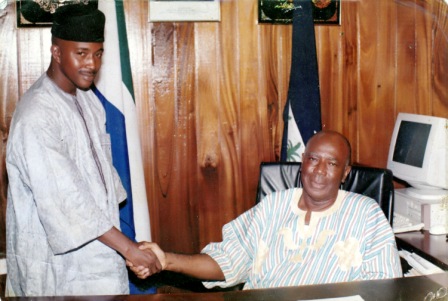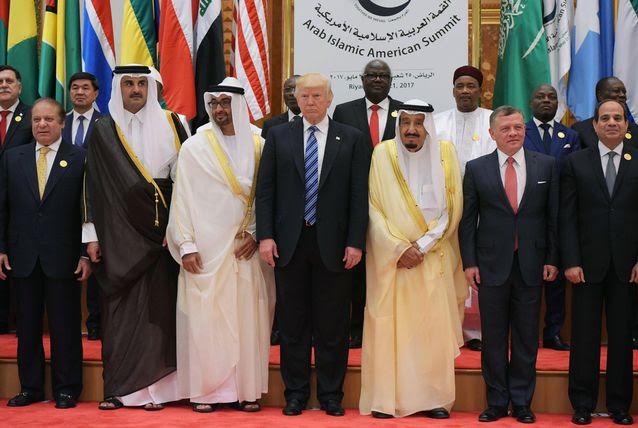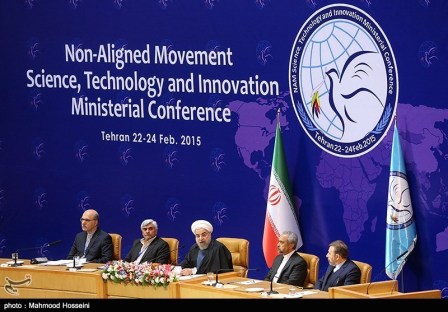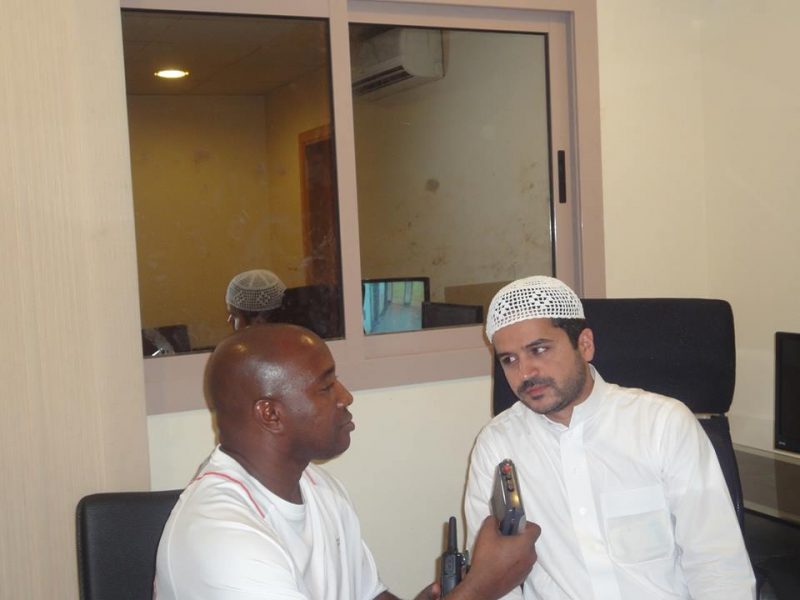Flashback: One-on-one with President Kabbah in 2001
The African Champion’s former Acting Editor and now Press Attaché in the Kingdom of Saudi Arabia met former President Ahmad Tejan Kabbah (now late) at his State Lodge residence in the west end of Freetown for an exclusive interview in 2001. The interview was facilitated by Sorie Fofana, former Press Attaché to the United Kingdom and now Publisher of Global Times newspaper. In my one hour one-on-one with the former President, we talked on a couple of issues – politics, peace, development and his international assignments with the United Nations, among other vital issues. (Photo: r-l : The late former President Ahmad Tejan Kabbah in warm hand shake with his interviewer after the interview) Read on:
Alhaji Jalloh: We all know that you served at the United Nations. How many years did you serve and what exactly were you doing?
Tejan Kabbah: I served for 22 years. I started as Deputy Chief of the West African Division. Later on, I went to Eastern- Southern Africa as the UNDP Resident Representative, and came back to work as Deputy Director of personnel at the UN Headquarters. I also worked in the Administration /Management service as Director.
What actually inspired you to get into politics?
I was pushed into it.
What has been your greatest obstacle since you entered into politics?
Well, you have to look at that question in the context of what I inherited as a bankrupt economy. I inherited a completely disloyal set of security forces. There were no logistics for them to do their jobs, even if they wanted to. I inherited a civil service that paid attention to things other than the concerns of the country. Perhaps it was rightly so, because the time I became president it was very common with some employees in the civil service earning about Le 4,000 a month.
It was so shocking that we had to enact a minimum wage law with a minimum salary that, though low, was several times above the original. It was illegal to pay wage earners less than Le 21,000 per month. Therefore, when you consider that somebody earning about Le 4,000 a month and that person has to travel to work, apart from what he would consume for a day, then that person is not going to survive for the rest of the month. It was very unreasonable for one to expect such a person to be productive. Mr. Jalloh, let me also add here that the country was completely divided and fragmented into regions and tribes. So we are trying to bring about national cohesion to see how best we will move the country forward.
Your Excellency, almost everybody is happy that the Lome Peace Agreement and Abuja Ceasefire Agreement had worked magic in providing a peaceful environment. However, the first Abidjan Peace Accord did not hold. What actually went wrong?
Well, Foday Sankoh clearly did not negotiate in good faith. After the agreement was signed and agreed upon, he did not deliver his own side of the agreement. And that was what happened to the Abidjan Accord.
Reflecting on the rebels’ insincerity to various peace agreements, many people are with the view that the RUF members are still hiding guns and awaiting the day United Nations Troops leave the country in order to strike again. Do you share such a view?
No, I don’t. It will be unrealistic for anybody to say that there will be one hundred percent disarmament. The irony is you must have people who would hide their own guns here and there. But as time goes on, we hope to be able to do a series of cordon and search exercises
to uncover any hidden guns and ammunition.
Mr. President, the war has almost come to an end. What plans do you have towards the reconstruction of all devastated areas in the country?
Somebody once told me that this is the first time he has somebody at war and that person planning for reconstruction as well. This is precisely what we have been doing while we work towards ending the war. We were at the same time planning the reconstruction of the country. For example, as far back as 1997, I went to the European Union in Brussels and talked to them about the question of reconstruction. I was able to get a commitment to finance a lot of our projects including roads, which they agreed to do for us when the security situation improves. What we intend to do is, as soon as the security situation has stabilized, to be able to start implementing all the projects, we will come out with a design or negotiations for the contracts towards reconstruction. Also, we have been very busy working on the Bumbuna Hydro Electric project because we cannot develop this country without continuous electricity supply. We have
other projects in the pipeline, all forming part of the nationwide\ reconstruction.
Mr. President, it’s really pathetic to see a good number of amputees roaming the streets begging for alms. What plans do you have for such war victims?
It’s a pity that they had to go through that experience. But all we can do at the moment is to prepare them in such a way that they will be able to do certain things to be independent, and at the same time earn some money. We have various projects to provide for them. Also, we will try to give them jobs to be able to get them gainfully employed.
The recently held National Consultative Conference endorsed the district block system for the next elections. But opposition parties are saying that the conference was stage – managed to suit your party’s political aspirations. Any comments, sir?
Well, my own understanding is, first of all, I was not directly involved in all the arrangement of the conference. Secondly, the report I received and what I saw on the television was very clear that it was almost a unanimous decision. It was not like one person trying to express his opinion or impose his decision on the others. We choose the people who are members of the Electoral Commission in consultation with the leaders of all political parties in parliament and their nomination were eventually endorsed by parliament. I really do not see how we could get them to do anything that is not right. Don’t forget the people of Sierra Leone opposed the PR system because they felt that members of parliament completely cut themselves away from the ordinary people. And the MPs did not know the aspirations and concerns of the people of this country. However, they wanted a system that would expose the MPs to keep them abreast with the concerns and aspirations of the people.
That’s one of the main issues; one way would have been to go through the constituency system, which is fine. At least, you have one person confronting the constituency and that person is accountable to the people of that constituency. But to be able to do that will take a long time. Surprisingly, the very opposition members were the ones saying that we should abandon our constitution because they wanted to join governance through the backdoor. Interestingly, our constitution had foreseen a situation such as the one we now find ourselves in whereby it is not possible to hold elections when due. The solution proposed was that there should be six months extension of the life of government and parliament at a time until the environmental condition is conducive for the conduct of free and fair elections. And we resorted to this, using the provisions of the constitution, the same opposition people came back to say that we are afraid to face the electorate. Against this background, the Electoral Commission came up with the next best solution, which is to expose all candidates to the electorate to have a say as to who goes to parliament or gets elected. And this is how the district block system came about. Really, people who are confident that they have the confidence of the people, and have the support of the people of this country would not care as to which system is there or not. It is only those who want to go to heaven before they die that are creating all these problems.
There is accusation in some quarters that you personally appointed the Commissioners who make up the National Electoral Commission and who would assist the SLPP to win the forthcoming elections. Do you want to respond to that accusation?
Let me tell you what we went through in putting together the Electoral Commission. Right here, in this room, I invited all the leaders of the political parties. They came here, and with one
objective, scrutinized the list of people who were to form the Electoral Commission. They all agreed. We took the list also to parliament and parliament had to endorse it. Foday Sankoh later came into the picture, we discussed it with him and he accepted the nominees. With that explanation you could see that some people are only trying to be mischievous.
Considering the criticisms coming from certain quarters that your government has failed the nation in terms of economic development, don’t you foresee that SLPP stands to lose the forthcoming elections?
I think you were in this country during those difficult days. In the first place, people making that sort of statement were those who destroyed this country. I am not saying that they destroyed this country physically, but they destroyed the minds of Sierra Leoneans. When the work really got heated up, every day they were writing in the newspapers and shouting on the radio that… please the President should do nothing else but must concentrate only on the war. And, of course, it is a very common thing that you can only develop when there is total peace. In our case, we did both things in our quest to close this country’s sad political and economic chapter. This is to say that, we have made a lot of very important moves towards development and addressing developmental problems. It’s paramount to say that if you go through some archives there are statements issued by World Bank, IMF and other donor agencies praising the government for the type of projects we have implemented.
Let me tell you another important thing, when I contested for the 1996 elections, I told the people of this country, saying that if they vote for us we shall bring the war to an end, we have done that, I also said, if you vote for us, we shall try and do everything possible to create opportunities for Sierra Leoneans to realize their potentials. We are doing that. An example of this is the micro-credit system. We are also trying to create minor entrepreneurs. We have tried to rebuild institutions that the former governments destroyed. Why do people so easily forget all these achievements? Let me tell you, four former military men and their governments tried to end this war. J.S Momoh failed, Srtasser and Maada Bio failed and J.P. Koroma added salt to injury. But as a civilian government, we have succeeded not only in ending the war, but also preparing a way for the economy to take shape. And we need to be commended for that. Now the question as to whether the person vote for us or not, to me, is immaterial, because what is material is, we have achieved something for the people of this country. If the people themselves can appreciate our efforts and relentless strides toward bringing peace and economic development, it is up to them to decide what party they will cast their votes for.
Mr. President, you have not come out officially to say whether you will contest for the presidency for the second time. Do you have that intention, sir?
At this point in time, my utmost concern is to do fine tune what I set out to do for this country. When I have finished that, then, I can think about what to do next.
When is the Special Court going to start proceedings?
Not yet because we are expecting it early next year. A mission is to come to Sierra Leone to make the final proposals.
I could remember there were series of newspaper publications asserting that you were involved in oil deal a couple of months ago. Can you throw light on that allegation for public interest?
That was complete rubbish. There was a representative of a firm that phoned me directly from Ghana. They had a “scientific” trip in West Africa that was going on. They had written to the Ministry of Mines nine months before that asking to come and do a survey for the exploration of oil in Sierra Leone. They spoke to me that unless they receive a reply within two days; the ship was going to Ghana and United States and never come back to Sierra Leone again. According to them, they were very sure that Sierra Leone would have oil. I imagined what that would do to the economy; I took a phone and asked that they come immediately. They came and signed a Memorandum of Understanding, not a contract and there was to be an expenditure, which somebody was to undertake.
However, they decided to undertake that expenditure and that included the cost of collecting the data and were prepared to do all that. Now somebody saw that. That person who saw that was interested in another company coming to do the similar survey. So there were two companies that went into rivalry. The other company did not get our approval partly because they did not have all the equipment to carry out the survey. Nobody was paid a single cent, and the government also did not pay them anything.
The publication that I was involved in an oil deal was complete misinformation, which is very common in our press here. To get the gist of the matter, the Chamber of Commerce decided to organize a seminar and invited representative of government, oil exporters, parliamentarians, journalists, lawyers, university students etc. to look into the allegation. In the final analysis, they all came to the conclusion that was a false alarm, and there was nothing to the allegation.
Based on that, we have now prepared legislation, and also prepare a model agreement. Hopefully, the prospect of the oil exploration will continue. When I went to Libya recently, I even discussed it with them because they have a lot of experience in that area. They depend almost exclusively on oil exploration and that makes their economy very strong. They willingly offered to send people to come and review what has been done and what needs to be done for the benefit of the people of Sierra Leone.
Finally, president Kabbah, what message do you have for RUF, CDF and politicians with regards to peace, reconciliation and the forthcoming general elections?
Well those who are believed to have committed crimes and violently attacked Sierra Leoneans in their country, I would ask that they come out genuinely to apologize. With regards to the elections, I would like to advise all sections including ex-combatants who are going to be contesting for positions during elections that, they should look at the forthcoming elections as a friendly contest. It’s like going to play a football match, if you play a football match with me and you win, I should be able to congratulate you, if we meet another time and I also win, the opponent should be able to congratulate the winner. I think it is time for us to behave like civilized people.
Without peace, this country will never get anywhere, and our people will continue to suffer, with peace, we shall get the confidence of foreigners who may want to come to invest in this country. But don’t forget this, even a country like United States, the richest country on earth, and European countries depend on foreign investment to be able to create job opportunities for their people. Nobody, and no serious businessman, will come and invest in a country where there is always rebel fighting, killing of people, burning of houses etc. They will not come. The only way for this country to attract foreign investors is for us to change our attitudes, cooperate with each other and work for the good of Sierra Leone. And the best way to work for the good of Sierra Leone is for us to strop our aggressive tendencies. And above all, whatever we do, we should put Sierra Leone first.
Thank you Mr. President.
It’s a pleasure, Mr. Jalloh.
Stay with Sierra Express Media, for your trusted place in news!
© 2014, https:. All rights reserved.






